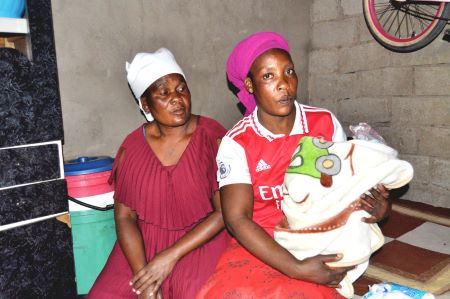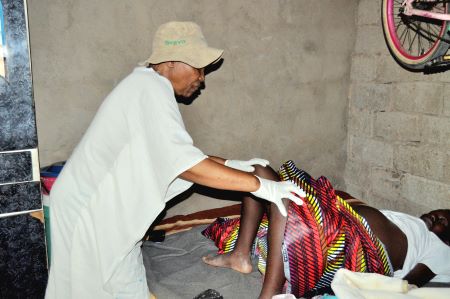Regina Rumbidzai Pasipanodya
Around 11 pm on September 17, 2023, Memory Sengwa (19) a mother of a two-and-a-half-month-old baby girl from Epworth which is about 19 km from the Harare Central Business Department could barely walk on her own due to severe backache.
On this fateful day, Sengwa who was experiencing labour pains, struggled to get to ‘gogo Nyakudanga’ one of the Traditional Birth Attendance (TBA)’ s houses in Epworth hoping to get help before anything could happen to her unborn baby.
Unfortunately, she had been turned away from the clinic after failing to present cash for her maternity booking fee.

Epworth traditional birth attendance feeling the baby’s pulse
“When I started experiencing labour pains, I called out for help from the neighbours who then rushed me to the local clinic for medical assistance but upon arriving at the clinic, they said that they could not admit demanding that I should have to pay the maternity fees first before they could attend to me.”
She did not have any money for maternal booking so she was forced to leave the clinic despite being in a critical condition.
Sengwa is one of the unfortunate mothers in Zimbabwe who are failing to get access to maternal healthcare as most mothers cannot raise the required fees and other requirements like gloves, code clamp, cotton wool, surgical blades, and other clothing before they can be admitted due to economic hardships experienced in the country.

In Zimbabwe, maternal healthcare booking fees for local clinics range between USD35 to USD50 depending on the area.
However, the amount seems to be too high since most people especially the underprivileged women from communities like Epworth cannot afford it and end up forcing them to seek assistance from TBAs during childbirth.
“When I left the clinic my only hope was now with ‘gogo’ Nyakudanga and I had to try harder to get to her place which is about two km from the clinic upon arriving at her place I was fortunate enough to find her and quickly she attended to me.
“With no time, I safely delivered a baby girl who I named Kudzwaishe (meaning God to be praised) because I feel that I had done something that I did not think I could do in such a dire situation,” she said.
This was her first pregnancy.
Hers is not a unique story as most girls and women in the Epworth community are now seeking maternal care from TBAs since they cannot afford the maternal fees.
Access to maternal healthcare
According to an Amnesty International report in 2021, pregnant women and girls in Zimbabwe shun public healthcare facilities in favour of home-based deliveries due to inadequate health infrastructure, cultural practices, and high hospital costs exposing mothers to childbirth-related injuries like obstetric fistula.
Since 2010, TBAs in Epworth have been bridging the gap in poor access to healthcare services in the community as their services have become s solution to the immediate challenges faced by would-be mothers.
Most women in this community cannot afford maternity fees.

New mother and Epworth birth attendance welcoming the new baby
Access to quality formal healthcare services in Zimbabwe is becoming quite low, a condition that is blamed for the country’s current high maternal mortality figures where at least 10 women die daily due to pregnancy-related factors and a much larger number suffer from short and long-term maternal-related morbidities.
Amnesty International further revealed that Zimbabwe has one of the highest maternal mortality rates in the world and pregnant women have to gamble with their lives by opting for home births due to underfunded and under-resourced government hospitals or because they cannot afford the cost of care.
Zimstats 2022 Preliminary Results of Housing and Population Census revealed that maternal mortality is currently 363 per 100,000 live births.
Survival strategies
A survey conducted by this reporter in Epworth revealed that most women in this community are now turning to TBAs as a survival strategy to save their unborn babies.
In Zimbabwe, for years TBAs have traditionally been assisting women during childbirth emergencies as well as providing community members with pregnancy monitoring, emotional support, and practical assistance both before and after childbirth.
But for the Epworth community, TBAs are providing underprivileged mothers with a chance towards safe delivery with the care of a self-appointed group of women who are providing maternal health care to desperate mothers.
In an interview with She Corresponds Africa, Melody ‘gogo’ Nyakudanga a leader of the TBAs in Epworth said that access to maternal healthcare has been a challenge in her community, a situation that has been worsened by the dwindling health sector.
“As the elders of the community where most of you girls are falling pregnant and do not have support systems, we took it upon ourselves to get the necessary knowledge through maternal healthcare training to prepare ourselves so that we can help desperate mothers in our community.
I would like to confirm that here in Epworth things are not well, I know very well that mothers are struggling to put food on the table let alone raise money for maternal bookings. Truth be told no woman does not want to deliver her child in a safe environment like a clinic or hospital but the situation has been putting women in a compromising position leading to either do or die,” said ‘gogo’ Nyakudanga.
Since 2010, several women voluntarily joined the group of TBAs in Epworth offering help towards mothers during childbirth emergencies and today there are about 65 licenced TBAs who are working as a team in Epworth.
Nowadays, a lot of things are being required for someone to get admitted to a clinic such as maternity booking fees, preparation (baby clothing), gloves, surgical blades, and code clamp among other things which has been a burden on the majority of mothers who cannot afford such.
When we started we did not know safe childbirth delivery, by with the help of Soroptimist International we were trained in Mother and Child care and emergency delivery as well as training in First Aid with St John’s clinic” she said.
Due to that women opt for home-based birth where they can escape such demands.
This has seen the TBAs gaining the trust of Epworth community members, thus, becoming an integral part of birth-related services in the area.
Jessica Mware (21) who also gave birth under the TBAs said that throughout her pregnancy she would often visit any one of the TBAs from gogo’s team pretending to have come for a casual visit.
“I would go as if I wanted to check up on them but when I got there they would ask how I was feeling, give some tips on how to have a healthy pregnancy. Although they would always encourage me to go and book at the clinic, I could tell them that I could not afford it.
So then I got into labour I had to delay going to gogo’s place knowing that they would force me to go to the clinic since they only attend to emergencies,” she said
When they heard that I was experiencing labour pains, they rushed to my place to check up on me. By the look of things, I think it was too late to send me to the clinic.
They quickly helped me deliver my child safely and it was a girl.
Government position
In Zimbabwe, however, analysts believe that government intentions towards improving maternal healthcare are somewhat confusing.
Although Zimbabwe’s Ministry of Health and Child Care advises women to give birth in health facilities, demographic data indicates that nearly one-quarter of women give birth without skilled assistance due to different reasons like exorbitant maternal healthcare fees as well as the fear of being shamed by health professionals and concern over lack of privacy and confidentiality among health care workers in different communities.
UNICEF has reported that midwifery training in Zimbabwe has been scaling up as several training schools for midwifery have been opening to lessen the shortage of skilled staff to reduce maternal mortality rates and improve maternal health.
However, the healthcare sector has been failing the desperate mothers as the burden of providing the antenatal care-related kits is now imposed on them leaving them with very limited choices but to turn to TBAs.
However, the Zimbabwe National Traditional Healers Association (ZINATHA) believes that the field of maternal health care should also be entrusted to TBAs who can cater to under-privileged mothers as well as whose midwifery roles range from taking care of pregnancy and childbirth to treating infertility and to playing an advisory role in family matters.
ZINATHA President, George Kandiero said, “TBAs have always played a critical role in our society, attending to would-be mothers whenever necessary and with the poor performance of the healthcare sector what could the mothers do in such a situation?
They need to give birth but they cannot afford the hospitals, so I believe that the TBAs should be given the recognition that they deserve because they are doing what the government is failing to do; providing safe maternal healthcare to all mothers in the country”
I believe that until the government of Zimbabwe commits to make maternal healthcare freely available and accessible to anyone who needs it, pregnant women and girls will remain vulnerable to risks related to giving birth,” said Kandiero.
An effort to get a comment from the Harare Provincial Medical Director Dr. Innocent Hove, said that he could not give She Corresponds Africa any official statement unless the media house submitted its memorandum, and registration certificate that it is a registered media house in Zimbabwe.
“You will have to bring them to me because I do not have time to do background checks myself,” he said.
Harare City Council Epidemiologist Dr. Michael Vere however confirmed that the TBAs have always been filling in the gap within the maternal healthcare.
“It is unfortunate that expecting mothers are faced with several challenges when it comes to access to maternal healthcare like the cost of travel and the cost of the service in the local clinics or hospitals. Therefore, due to financial barriers have been turning to the service of the TBAs.
“However, there are dangers and risks that are exposed to expecting mothers who seek help from TBAs since there won’t be close monitoring, antenatal tests and even when there is a dire complication that needs surgical intervention. To address these issues the government has been providing free maternal healthcare service in rural areas and as for Harare City Health our charges for maternal health have been as little as USD25,” said Dr Vere.
photso credit Regina Rumbidzai Pasipanodya




